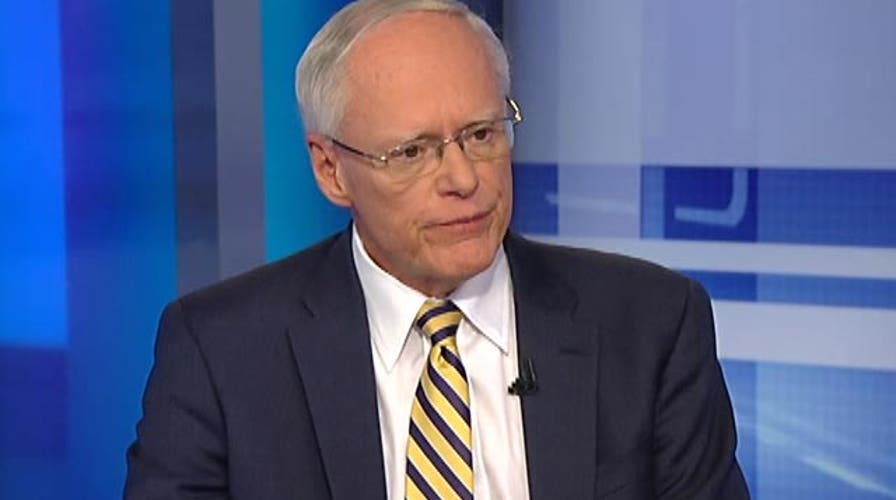Former Obama ambassador: 'We're in a goddamn freefall here!'
President's former ambassador to Iraq blasts the multiple crises plaguing the administration and the apparent implosion of Obama's Middle East policy
This is a rush transcript from "On the Record," March 27, 2015. This copy may not be in its final form and may be updated.
GRETA VAN SUSTEREN, FOX NEWS HOST: Check out this list, and it is certainly not complete. The rise of ISIS. Iran threatening a nuclear weapon or building one, and if we don't lift sanctions, they're going to do that. Yemen in a meltdown - so bad in Yemen that the United States embassy just closed up and fled the country.
And now President Obama's former ambassador to Iraq describing the president's foreign policy as a "G.D. freefall."
The former U.S. ambassador to Iraq, James Jeffrey, joins us. Good evening, Ambassador.
JAMES JEFFREY, FORMER U.S. AMBASSADOR TO IRAQ: Good evening, Greta.
VAN SUSTEREN: How do we get to this position where we have a civil war meltdown in Yemen and we have problems in Syria and we have Iraq, Iran? How do we get to this mess?
JEFFREY: It's easy to blame the United States. We haven't done everything right. But you start off with a region that, as long as I've been involved, since 1974, is in one or another in a state of crisis. What's new is, in the last few years, basically, since the rise of al Qaeda, the situation has gotten worse. And the recipes that we have tried to use to stem the violence and to stem the destabilization, the basic challenge to the nation states in the region by one or another Islamic religious movement, be it Iranians, be it ISIS or al Qaeda, have not been successful. Now we're at a crisis point.
VAN SUSTEREN: You say the recipes we've used haven't worked. What recipes? How would you define those recipes?
JEFFREY: We have tried major interventions after 9/11. They got some success. We have democracies today in Afghanistan and Iraq but they're under a lot of pressure. And the American people were not particularly supportive of large commitments of American troops. President Obama was going to fix that. We don't have the military commitment we had a decade ago. We have more support, at least up until very recently, from the American public to that. But the situation in the region has destabilized considerably more rapidly than under President Bush.
VAN SUSTEREN: So how do we begin to fix this? What should we be doing? This is a national security issue now, right?
JEFFREY: Right.
VAN SUSTEREN: OK. So what should we do?
JEFFREY: First, the president needs to tell us, related to the Iranian negotiations, what his plan for Iran is. If his goal is to sign an agreement to stem a nuclear breakout, that's one thing. If his goal is to attempt to form a cooperative relationship with Iran, which many suspect that he has not admitted, we need to know that as well. Right now, the evidence is, from Yemen, Tikrit, Iraq and from Syria that Iran is on the move, challenging our friends and allies throughout the region. And this is contributing to this sense of chaos that you described so well.
VAN SUSTEREN: Well, you mentioned -- I mean, we have talked about Iran. We have no idea what this agreement might be or if there is going to be an agreement. Of course, Israel has -- Prime Minister Netanyahu said at the very beginning that he has no tolerance for his nation for any enrichment capability of Iran. It looks like we will strike some deal that maybe will give them some enrichment capabilities, just not nuclear weapons capabilities.
JEFFREY: That's exactly what it is. We are going to -- if it's successful, as I understand it, we will push Iran back to a one-year breakout period, assuming inspectors and other monitoring actually worked. They have not worked in the past, but --
(CROSSTALK)
VAN SUSTEREN: I was going to say, we didn't even know they had an underground enrichment plan, because they were so clever at hiding it.
JEFFREY: So they have a bad record. But even assuming it does work, you still will have an Iran that will be within a year of a breakout. The problem that this administration and the last one had with Iran is for sanctions to work you have to have the support of the entire international community, because it's not trade with us, it's trade with India, with China, with Western Europe, with Africa. To get those people on board, you can't insist on no enrichment. They won't go along.
VAN SUSTEREN: Because, well, then they will want enrichment, too.
JEFFREY: It's worse than that.
VAN SUSTEREN: Worse than that.
Ambassador, nice to see you. I hope you're come back soon.
JEFFREY: Thank you very much.

